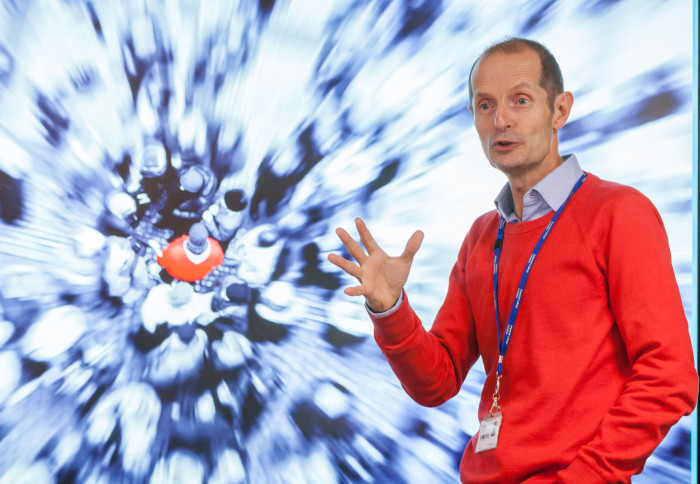Imperial academics share latest COVID-19 research with international community

Imperial researchers working on coronavirus shared their latest work with an international community of diplomats, academics, and science attachés.
The Imperial Global Science Policy Forum (IGSPF) online event focused on Imperial's role supporting the international response to the COVID-19 pandemic.
More than 300 delegates from global universities, Embassies, and industry joined Imperial academics to hear about their latest coronavirus research.
Vice President Maggie Dallman, who chaired the event, said: “The COVID-19 pandemic has caused us to make a number of really rapid but profound changes in the ways we work and operate as scientists and a university, but one thing that has not changed is our commitment to working with international colleagues and partners.
"It is clear that the pandemic, as well as other global challenges cannot be solved by one country or less still by one university alone, and that we will need collaboration and cooperation from all, including support from our international partners and collaborators."
Public Health: Tracking the spread of the virus

Professor Helen Ward, from the School of Public Health, talked about the REACT study – a major programme of home testing for COVID-19 to track the progress of the infection across England.
Professor Ward said: "Active surveillance is particularly crucial as the virus has a wide spectrum of disease.
"In order to find cases across community, and not just those in hospital, we need to go out into the community."
The REACT trial is currently randomly sampling 100,000 adults to show how widespread virus is and to reveal which communities and demographics are most affected.
Professor Ward added that she thinks less invasive tests than nasal swabs may be available in September.
Professor Ward also highlighted the free COVID-19 course that she has developed with others and launched with the Jameel Institue (JIDEA) on Coursera called Science Matters: Let's Talk about COVID-19.
The course has been taken by more than 100,000 people and Professor Ward thinks that it can help build trust further in scientists.
Diagnostics: rapid tests for coronavirus detection

Dr Pantelis Georgiou, from the Department of Electrical and Electronic Engineering, talked about the work of his team which are developing a cutting-edge ‘lab on a chip’ diagnostic platform using microchip technology that can be paired with a smartphone application to rapidly identify whether a person is positive for the virus from a nasal or throat swab.
Dr Georgiou said: "The microchip technology we use is the same as those powering your mobile phone. The Lab-on-a-chip is taking the functionality of a big laboratory and miniaturising it on small chip to analyse a sample.
"There is an urgent need for a rapid diagnostic technology that can tell you if you are infected with coronavirus – and not another condition such as flu or hay fever. This will help inform people as to whether they should isolate or continue with work and their daily lives as normal."
The test also has capability for a real-time surveillance system which can give very detailed information on where the virus hotspots might be.
Dr Georgiou's project has been funded by the donor-backed Imperial COVID-19 Response Fund, to scale up their device to 1,000 tests.
Vaccine: a new approach to development and manufacturing

Professor Robin Shattock, from the Department of Infectious Diseases, and his team are working on an RNA vaccine to combat the coronavirus COVID-19.
The self-amplifying RNA vaccine works by effectively injecting new genetic code into a muscle, instructing it to make a protein found on the surface of coronavirus, which triggers a protective immune response.
Professor Shattock, was one of two projects in the UK to receive government funding, and human trials have now begun.
Professor Shattock said: "We’ve been working on developing a very new approach to vaccine and have been able to apply to covid-19 pandemic."
At the World Economic Forum in 2019, Professor Shattock presented his vaccine research to global leaders and told global lead that pandemics are coming we need a platform that can work quickly.
Professor Shattock added: "The advantage of our technology is we make vaccines through a fully synthetic process.
"We can generate them at low cost with a low manufacturing process and make millions of doses in a few weeks."
If successful, Imperial and Professor Shattock have formed a social enterprise to bring the vaccine to the world.
For the UK and low-income countries abroad, it will waive royalties and charge only modest cost-plus prices to sustain the enterprise’s work, accelerate global distribution and support new research.
Translation and innovation: Entrepreneurial students and staff helping to tackle virus

Dr Simon Hepworth, Director of Enterprise, talked about some of the different and inspiring ways in which Imperial's entrepreneurial community of staff and students have been responding to the pandemic; from volunteers making disposable visors for hospitals, to the design of a low cost emergency ventilator.
Dr Hepworth also highlighted a project to encourage hand washing around the world, and a start-up which has developed water-based sweets to keep patients hydrated.
Dr Hepworth said that the Imperial College Innovation Fund had received substantial backing and was already helping to support between 10 to 15 startups.
Article text (excluding photos or graphics) © Imperial College London.
Photos and graphics subject to third party copyright used with permission or © Imperial College London.
Reporter
Stephen Johns
Communications Division